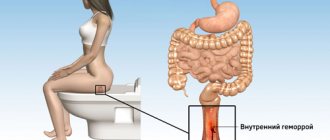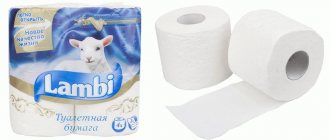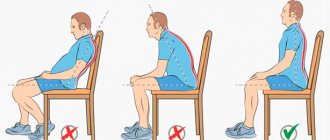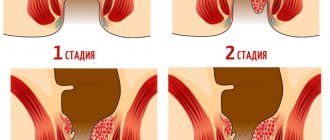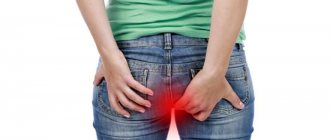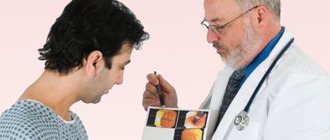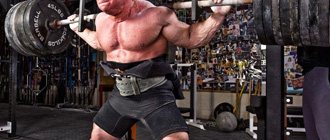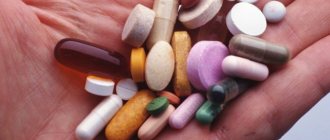In the modern world, constipation is a common problem not only for older people, but also for middle-aged people and even young people.
However, many people do not even realize what health problems can be caused by dysfunction of bowel movements.
Meanwhile, constipation (obstipation) is one of the causes of a very unpleasant and painful disease - hemorrhoids. Moreover, intestinal blockage not only precedes the onset of the disease, but also contributes to exacerbations during its course.
If you ignore the problem and endure constant discomfort, this will ultimately lead to the need for surgical intervention (surgery).
To avoid such problems, you need to know what factors can lead to hemorrhoids, and what treatment will be most effective.
And, of course, do not put off visiting a proctologist, who will draw up a competent course of treatment and help you get rid of an unpleasant and “delicate” problem.
Why do constipation and hemorrhoids often go hand in hand?
Both constipation and hemorrhoids are disorders of the functioning of the gastrointestinal tract, and in most cases, clogging of the intestines with feces causes the appearance of hemorrhoidal cones in the anus. And if constipation becomes
a very common problem or becomes chronic, you should expect hemorrhoids to appear soon.
Difficulty with defecation causes most complications, since a person must push very hard.
Over time, the hard and dry masses of feces will increasingly contribute to inflammation of the anus and the formation of lumps. During defecation (emptying), such bumps can come out, causing injury and causing acute pain.
Stagnation of feces in the rectum negatively affects the functioning of the entire body and leads to:
- the occurrence of pain in the lower abdomen;
- metabolic disorders;
- flatulence and excessive gas formation;
- organ intoxication;
- deterioration of health.
Therefore, when the first symptoms of constipation appear, treatment should be started immediately to avoid more serious health problems, in particular hemorrhoids. You should consult a doctor if:
- no urge to go to the toilet “for the most part” for more than 3 days;
- there is insufficient feces excretion (feces come out in small portions);
- When defecating, hard and dry stool comes out or other difficulties arise.
Constipation and diet goals
Constipation (constipation) can be a cause or consequence of an underlying disease, but in any case they appear against the background of a disorder of the basic functions of the intestine.
Despite the immutable truths that the most successful treatment can only be from the earliest stages of the disease, many people try to get rid of constipation on their own until the very end.
As a result, at the time of seeking qualified help, the problem is in a deeply advanced state.
And to decide how to go to the toilet, you have to consult a doctor.
Accordingly, in order not to bring the situation to such a state, you need to learn to eat healthier foods.
For constipation and hemorrhoids, treatment should be limited to normalizing digestion and facilitating the process of bowel movements.
On the other hand, nutrition for hemorrhoids and constipation should solve certain problems, while ensuring the health of the body as a whole.
Proper nutrition brings with it a number of benefits and solutions to many problems:
- fight against excess weight;
- normalizing digestive processes;
- normalization of metabolic processes;
- ensuring regular bowel movements;
- eliminating possible causes of constipation;
- elimination and relief of hemorrhoids.
Developing healthy eating habits is essential as they are an important part of the therapeutic process.
Thanks to proper nutrition, the body’s internal reserves are activated, which, in combination with the necessary medications, will ensure active resistance to the disease and effective cure.
Video:
To treat constipation and hemorrhoids, it is important to completely cleanse the intestines. For these purposes, constipation suppositories, enemas, and laxatives are used.
However, it is not recommended to overuse such treatment methods, since intensive intestinal lavage can remove beneficial bacteria. As a result, the level of immunity decreases significantly.
A diet for hemorrhoids and frequent constipation should contain the answer to the question of how to eat properly.
Most doctors recommend fractional nutrition, which consists of frequent small amounts of food.
A person who eats this way will reduce the load on the gastrointestinal tract and will also be able to normalize the body’s metabolism.
When eating food, chew it thoroughly and drink plenty of water. Compotes made from pears and prunes will be especially useful.
What is special about the combined problem?
The development of such an ailment as constipation occurs differently for everyone. Since the reasons that cause it can be completely different. For example, in one person constipation and hemorrhoids appear due to a sedentary lifestyle, while in another the disorder is caused by constant fasting and dieting.
Therefore, before starting treatment, it is necessary to accurately determine the cause of the disease.
Very often the factors causing the problem are:
- improperly adjusted nutrition - the diet does not have enough fiber (vegetables and fruits), and fats and carbohydrates predominate (meat, baked goods, sweets);
- long-term fasting and meager diets - a small amount of food does not move well through the intestines, causing stagnation;
- diseases of internal organs that create a mechanical blockage for emptying - including pregnancy and obesity;
- deterioration of gastrointestinal motility - due to lack of fluid intake (less than 2 liters per day);
- psychological factor - stressful situations and difficult problems can block the urge to defecate (and in some people they cause diarrhea);
- a sedentary or “sedentary” lifestyle - lack of physical activity leads to a decrease in intestinal tone and impaired blood circulation in it;
- use of medications - some tablets can significantly disrupt the balance of intestinal microflora, which leads to hardening of the stool.
Depending on the cause of the disease, the proctologist will prescribe complex treatment.
In people suffering from hemorrhoids, constipation can also be caused by enlarged internal lumps in the anus.
Such growths very often become a mechanical obstacle to the free movement of feces to the exit. In this case, a kind of vicious circle arises.
Stagnation of feces irritates the walls of the colon and contributes to the formation of new lumps, and they, in turn, do not allow bowel movements. Therefore, it is very important in such a situation to begin the treatment process as early as possible.
Traditional Treatments
Classic treatment methods used in most medical institutions include:
- laxatives - tablets, syrups;
- rectal suppositories;
- ointments and creams;
- therapeutic enemas.
Popular and effective drugs are:
- Glycerin suppositories are a safe and effective remedy that is prescribed even to children;
- Duphalac is a long-acting syrup based on lactulose;
- Mucofalk is a natural preparation for people who consume little food; its peculiarity is that it softens stool and increases its volume;
- Regulax drops - effectively liquefies stool;
- Norgalax rectal gel - the drug is injected into the anus 10 minutes before visiting the toilet;
- Guttalax - enhances colon peristalsis, and the effect occurs 6 hours after taking the drug.
The fact is that long-term use of laxatives can worsen the situation. At the same time, the person constantly needs to take medications and cannot go to the toilet on his own without them.
Folk remedies and their use
There are a huge number of recipes for combating constipation and hemorrhoidal disease, but they can only be used for treatment after consultation with your doctor.
Like pharmaceuticals, traditional recipes are not suitable for every person. And what is the best remedy for one, may cause the disease to worsen for another.
To effectively combat fecal stagnation in the large intestine, you can use the following methods:
- prepare a mixture of dried fruits (prunes, dried apricots, figs) and take 1 tbsp. spoon 30 minutes before meals;
- eat vegetables and fruits rich in fiber (cabbage, apples, peaches, pumpkin, plums);
- drink freshly squeezed beet juice - because it cleanses not only the stomach and intestines, but also the kidneys;
- take sunflower or olive oil;
- to achieve greater effect, you can also use Vaseline or castor oil ;
- unsalted lard suppositories for rectal administration - they will help the feces come out;
- Once every 7-10 days, do a cleansing enema of warm boiled water , slowly add about 1 liter of liquid and lie down for 20-30 minutes.
Nutrition for constipation
To combat constipation from hemorrhoids, follow a diet. A balanced diet and a well-established regimen of eating 5 times a day in small portions will help get rid of constipation.
Recommended:
- Soups.
- Porridge made from oatmeal, buckwheat, millet.
- Fermented milk products – kefir, fermented baked milk.
- Vegetables – cabbage, tomatoes, beets, cucumbers.
- Fruits - bananas, pears, apples, plums.
- Natural juices with pulp.
- Mineral water.
- Dried fruits – dried apricots, prunes.
- Nuts – peanuts, walnuts, almonds.
In case of acute illness, it is prohibited to consume:
- Porridge – rice, semolina.
- Chocolate.
- Bread of the highest quality.
- Strong tea, coffee, alcohol, soda.
And preventing the problem is not so difficult
To prevent problems with the gastrointestinal tract and exacerbations of “delicate” diseases, you should follow some rules and not neglect them in everyday life.
This will not only allow you to forget about illnesses and illnesses for a long time, but also improve your well-being, increase your vitality, and get rid of depression and stress. Moreover, their implementation does not require special efforts, special premises or spending fabulous sums of money.
One of these rules is following a diet. At the same time, you do not need to starve or limit yourself in food. For prevention and treatment
hemorrhoids and constipation, the diet should include:
- lean meat and fish;
- dairy products;
- bread made from coarse flour (possibly with grain additives and bran);
- of course, vegetables and fruits.
You should limit the consumption of baked goods, sweets, spices, fatty and fried foods.
The most important rule for the prevention of many diseases is to lead an active lifestyle. To do this, you don’t need to run to the gym or exhaust yourself with endless physical activity. It is enough to walk at least 5 km a day and do basic housework.
For example, you can wash the floors without using a mop, or take a walk in the nearest park, or go shopping with a friend. A trip to the countryside is not only a health benefit, but also a lot of unforgettable emotions. Swimming in the river, fishing, going to the forest to pick berries or mushrooms - all this, without a doubt, will benefit your health.
You can overcome hemorrhoids and constipation without effort by contacting a good proctologist and following all the necessary instructions. The main thing is not to let the disease progress and start treatment in the early stages.
But it’s more important to take care of your health in advance: don’t overeat, don’t indulge in unhealthy foods, and don’t take drastic measures to lose weight.
And the main thing to remember is that there is a real, huge, wonderful world besides the computer and TV.
stopvarikoz.net
Treatment of hemorrhoids and constipation
This disease is a complex problem. Hemorrhoids can cause constipation, which in turn can cause hemorrhoids.
It is important to start treatment in the early stages of the disease. Chronic constipation caused by late consultation with a doctor can most likely lead to hemorrhoids.
At the earliest stages of treatment of such a deviation, you can do without medical intervention.
To do this, you need to give up bad habits, fasting, and lead a calm, healthy lifestyle.
Treatment can be carried out using castor and sunflower oil or Vaseline. You can also use suppositories for constipation.
Medicines for constipation and hemorrhoids differ from each other. Constipation can be treated by thinning the stool, stimulating the stool, and increasing it.
Today, for the treatment of hemorrhoids, there are various dosage forms of medications: suppositories, solutions, tablets, ointments.
If an ailment such as hemorrhoids appears, it is better not to self-medicate, but to urgently consult a specialist.
Constipation after surgery occurs due to the weakening of all the muscles of the body, which acquire normal tone only after a certain period of time.
Treatment during this period should always begin with drinking plenty of fluids. Laxatives, enemas, and glycerin suppositories are prescribed for constipation.
Therapy is carried out against the background of a gentle diet, which contains cereals, vegetable soups, gray bread with bran, and fermented milk products.
After intestinal surgery, the power of peristalsis reaches a minimum, which can lead to stagnation and even obstruction.
Therefore, preference should be given to a dairy-vegetable diet, as well as drinking plenty of fluids.
The rehabilitation process after surgery can be long and last for several months.
What to do after hemorrhoid surgery is determined by the nature of the injury and the person’s psychological fear of sutures coming apart.
Drinking plenty of fluids and laxatives are recommended for the entire period of treatment. After removing hemorrhoids, glycerin suppositories should be used for constipation before bowel movements, and Vitaon oil should be used after bowel movements.
For faster healing of postoperative scars, it is recommended to use anti-constipation suppositories with sea buckthorn oil and methyluracil.
Rehabilitation periods after surgery can be quite long and difficult. It is recommended to stay in bed for the first two weeks, and only then begin light exercise.
The basis of future life should be movement and physical activity. Walking in the fresh air, swimming, yoga, running also contribute to good health and well-being.
At the same time, excessive force loads and heavy lifting should be avoided. Recovery after surgery should take place under the guidance of a proctologist.
Video:
Proper nutrition, sufficient fluid intake, physical activity and regular bowel movements are the key to effective treatment of this disease and the ability to defeat hemorrhoids.
All this, combined with the right diet and necessary medications, will provide excellent results.
Hemorrhoids are a pathology that affects the vessels of the rectal area. The disease has a progressive course and gradually becomes chronic. Periods of exacerbation are followed by periods of remission. In women, exacerbation of hemorrhoids is provoked by pregnancy and childbirth. In men, the provoking factor is physical activity - hard work, professional sports.
First aid for hemorrhoids is provided at home using simple traditional medicine methods in the initial stages of the disease. Emergency care for advanced cases and complications is carried out in a surgical hospital. After examination and a full examination, the attending physician will decide what to do to quickly and effectively help the patient.
Causes of constipation with hemorrhoids
The causes of constipation due to hemorrhoids may be as follows:
- dyskinesia of the rectum, as a result of which its motor ability and peristalsis are impaired;
- decreased intestinal muscle tone;
- disorders of nervous regulation.
- increased sphincter tone;
- decreased sensitivity of receptors.
The chances of constipation with hemorrhoids increase due to poor diet and poor drinking habits.
There are many other factors that can provoke the development of the problem. These include neurological disorders, pathologies of the endocrine system, use of iron supplements and many others.
Not drinking enough water increases the risk of constipation
Those who are interested in whether constipation can occur with hemorrhoids need to know about the main cause of the disorder. When hemorrhoids are inflamed, the act of defecation causes a lot of unpleasant sensations, the person experiences pain, burning, and bleeding may occur. The patient tries to empty his bowels less often so as not to feel pain. This causes feces to accumulate in the intestines, which obstructs the bowel and causes constipation.
Causes of constipation with hemorrhoids
The mechanism for the formation of hemorrhoids after constipation is clear, but why do some patients experience the opposite: first, hemorrhoids are detected, and then constipation occurs?
Proctologists identify 2 important factors in the mechanism of defecation disorders in hemorrhoids:
- Proctogenic - the result of dysfunction of the pelvic floor muscles, caused by chronic hemorrhoids in stages III–IV, prolapse of the perineum, and difficult childbirth. Damage to nerve branches is possible during surgery to remove nodes.
- Psychogenic - associated with the fear of a repetition of a painful attack, a mental reaction to the toilet. Each exacerbation, accompanied by cracks in the mucous membrane, is so difficult for a person to bear that he prefers to endure the desire to poop. In other cases, the cause of constipation is prolonged holding back of bowel movements due to uncomfortable conditions, constraint, or lack of a toilet. The process is similar to the formation of diarrhea during “bear” disease. The diagnosis is made based on the patient's truthful story after differential diagnosis.
A vicious cause-and-effect circle is formed:
- large internal nodes do not allow feces to pass freely through the intestinal lumen;
- bowel emptying is delayed, it becomes full, and forms hard stool;
- the veins through which blood flows are compressed;
- Internal and external nodes increase even more, blood circulation in the area is disrupted, injury promotes the release of blood;
- I can't go to the toilet.
Therefore, in the treatment of constipation, importance is attached to alleviating the patient’s condition with the help of stool softeners.
Treatment and its methods
How to treat constipation if hemorrhoids occur should only be determined by a specialist after examination. To eliminate the problem, they use medications, traditional methods, and also make recommendations regarding nutrition.
Treatment of constipation due to hemorrhoids should be determined by a doctor
Traditional therapy
The easiest way to get rid of constipation is if hemorrhoids have just begun to develop. To restore normal stool, medications with a laxative effect are used. A proctologist can select a suitable remedy for constipation and hemorrhoids. Most often the problem is solved using:
- Laxative fees. They remove waste products from the body and help normalize stool. But, if you have hemorrhoidal cones, you need to make sure that the medicine does not contain senna aquifolia.
- Castor oil. This is an affordable and effective laxative, but its use requires diet.
- Dufalaka. This is a potent remedy that is prescribed in most cases when the question arises of how to treat constipation with hemorrhoids.
- Glycerin suppositories. They are used even for stool disorders in children. The drug helps soften feces, heal wounds and fissures in the anal area and stimulates the process of defecation. These properties are especially necessary for hemorrhoids, since obstruction and hard feces can rupture hemorrhoids, which aggravates the inflammatory process.
- Gutallaxa. Within a few hours after taking the medicine, intestinal motility improves.
- Norgalaka. The product is produced in the form of a gel for rectal administration. Defecation occurs within a quarter of an hour after using the drug.
Castor oil is an inexpensive and effective remedy
What to do if hemorrhoids and constipation occur at the same time should be determined by a doctor, since during periods of exacerbation of the disease some laxatives are contraindicated.
Traditional methods
Treatment of constipation with hemorrhoids may include traditional medicine recipes, but some of them can aggravate the course of the disease, so it is not advisable to self-medicate. Each person’s body reacts differently to herbal infusions, decoctions and other unconventional methods, so before trying a recipe on yourself, it is better to show it to a doctor. Such therapy may include:
- Consumption of dried fruits. Combining dried apricots, prunes and figs and eating them 30 minutes before meals will normalize the digestion process and facilitate bowel movements.
- Senna decoction. Leaves of the plant in the amount of 20 g are poured into a glass of boiled water and kept on low heat for a little longer than a quarter of an hour. During this time, part of the liquid will evaporate, so after finishing preparing the medicine, you need to add water to it so as to get 200 g of decoction. You can take half a glass of the product per day.
Dried fruits speed up bowel movements
- Using sunflower or olive oil. Treatment of hemorrhoids with constipation can be carried out using similar remedies. It is enough to drink a spoonful of oil on an empty stomach and after a while you will feel the effect.
- Drinking beetroot juice in its pure form can quickly relieve constipation. But for kidney stones, it should be used with caution.
- Aloe juice with water. Add a teaspoon of the juice of this plant to a glass of water and drink on an empty stomach.
- Lard candles. They speed up the exit of feces. To do this, it is better to use solid, pre-frozen lard, which is cut into the form of rectal suppositories and inserted into the anus.
- Enemas. With their help you can quickly cleanse the intestines. To do this, you can use ordinary boiled water, which is injected into the intestines in an amount of one liter. Enemas made from vegetable oils also have a good effect. Olive, flax or sunflower oil must be heated to a temperature of 38 degrees in a water bath. You can carry out such procedures once a week, but not more often.
Beetroot juice is another popular and effective remedy.
People figured out what to do for constipation and hemorrhoids even before the invention of medications, but folk recipes are not suitable for everyone. Therefore, alternative treatment should be treated with caution.
Treating constipation and hemorrhoids at home
Treating constipation at home:
- Tansy decoction. Effects hemorrhoids, constipation, flatulence. Recipe: add a spoonful of dried tansy flowers to a glass of water. Boil and infuse for an hour. Strain the broth and take one tablespoon before eating 3 times a day.
- Enema with boiled water. Cleanses the intestines, prevents constipation, reduces the manifestation of internal hemorrhoids. A liter of warm liquid is taken into the enema and injected into the rectum. After the enema, lie down for 15 minutes. Apply once a week.
- Infusion of flax seeds. To prepare: pour 2 teaspoons of the seed into a glass of water, boil, and let steep for 12 hours. Drink a decoction with seeds.
- Aloe juice. Used with honey. In a ratio of 4 to 1. Drink a teaspoon 2 times a day.
- A decoction of dandelion leaves and roots. Grind the dandelion. For 3 tablespoons you need 400 ml of water. Boil and let sit for half a day. Take a tablespoon 3 times a day before meals.
- Rowan infusion. Collect red rowan before the onset of cold weather. Seal with a lid, after adding sugar. Let it brew for a month, strain the syrup. Dilute half a liter of the resulting composition with 50 ml of alcohol. In the morning before meals, take 25 ml of the resulting product.
- Nettle decoction. To prepare a nettle tincture, you need to prepare half a liter of boiling water for 2 tablespoons of leaves. Stir, leave for a day. The next day, drink the resulting solution in three doses before meals.
An additional action in the treatment of flatulence is an active lifestyle, walks, physical exercises that restore intestinal motility.
Nutritional Features
Nutrition for hemorrhoids and stool disorders is an important part of treatment. To avoid the development of constipation, rupture of hemorrhoids and worsening the course of the disease, it is necessary to make changes to the diet.
Hemorrhoids are significantly different from constipation, but these two problems often strike a person at the same time, so it is necessary to know what you can eat and what you should avoid to avoid problems.
To avoid constipation, you need to eat right
First of all, if you have a bowel disorder, you should avoid:
- legumes;
- milk with a high percentage of fat content;
- coffee, tea and other drinks with tonic properties;
- soda and alcohol;
- eggs
It is necessary to completely exclude fatty and fried foods, smoked foods, fresh baked goods and sweets from the diet. It is better to focus on low-fat kefir and yogurt, chicken, turkey and rabbit meat, fresh vegetables and fruits, and bran bread. It is better to eat small portions at least five times a day.
Physical activity is important to normalize bowel function
To improve the process of digesting food, you can drink a glass of warm water before eating. You must drink at least 1.5 liters of liquid per day.
Experts also recommend normalizing the level of physical activity in order not to aggravate the situation. It is advisable to do exercises daily. This helps to increase body tone and improve blood circulation.
Constipation caused by hemorrhoids can lead to serious consequences, so at the first symptoms you need to visit a proctologist who will select the appropriate course of treatment. Particular attention should be paid to diet and a healthy lifestyle.
The video shows exercises that need to be done for hemorrhoids to avoid constipation:
Doctors' opinions on constipation
For constipation, we recommend introducing more dietary fiber into your diet; if you can’t manage it with food, you can try preparations with plantain, they make the stool softer. Then you need to switch to normalizing stools only with diet. Do not get carried away with senade and saline laxatives, the intestines quickly get used to them. I advise you to visit a proctologist to find out the reasons for your complaints. Itching can be a symptom of internal hemorrhoids. It may well be because of the load. Hemorrhoids should be treated based on the results of a consultation with a proctologist.
https://health.mail.ru/consultation/1055071/
kishechnik.guru
Therapeutic diet
Treatment for constipation can only be successful in combination with proper nutrition. With this disease, it would be most appropriate to consume liquid food.
Doctors recommend limiting dietary intake to liquids only in the form of broths and juices once or twice a week.
The weekly menu must contain raw vegetables, fruits, and dairy products.
Dried apricots, prunes, and vegetable oil, when consumed regularly, normalize the functioning of the gastrointestinal tract in case of hemorrhoids and constipation.
At the same time, vegetables that can cause gas should be excluded from the diet. These include radishes, white cabbage, turnips, spinach, and sorrel.
Fruits and berries such as apples, gooseberries, raspberries, dates can also cause fermentation processes in the intestines, and it is recommended to limit their consumption.
A diet for hemorrhoids and frequent constipation involves the exclusion of milk, carbonated water, kvass, coffee and black tea, preference is given to fresh juices.
Oat and wheat bran, as well as various whole cereals, will be of great benefit. It is advisable to exclude spicy, salty, smoked, fatty and floury foods.
It will be useful to follow a certain algorithm for eating and make it a habit.
It is recommended to drink a glass of liquid in the morning on an empty stomach, after about twenty minutes you should take one teaspoon of vegetable oil. Only after this, after some time, start the main meal.
A prohibited product that can cause hemorrhoids is salt. It accumulates in the body, stretches the blood vessels, protruding their individual sections.
At the same time, meals should be as varied and frequent as possible.
What you can and cannot eat for hemorrhoids and constipation must be decided taking into account the problems that therapeutic nutrition is designed to solve.
Video:
The consumption of such products should lead to the following health effects:
- cause regular bowel movements;
- normalize the body's metabolism;
- can remove excess weight;
- stimulate intestinal motility;
- quickly relieve inflammation in hemorrhoids.
Solving such problems is impossible only with the use of medications, so the problem of how to get rid of constipation and hemorrhoids can be solved with the help of medications and a proper diet.
For people who suffer from constipation, it is better to avoid overeating, but on the other hand, fasting.
For this reason, the most beneficial for them will be fractional nutrition, which includes frequent meals of small amounts of food.
Against this background, you need to drink at least one and a half liters of liquid per day. It is advisable to exclude fatty foods and flour products from the diet, replacing them with vegetables and fruits.
It is also recommended to limit the consumption of fried foods, giving preference to boiled food. You can easily get used to a diet for hemorrhoids and constipation.
Constipation from a medical point of view
A one-time problem with going to the toilet is not considered a disease by gastroenterologists and proctologists. Perhaps this is an individual reaction to a new dish or a climate change that will quickly pass without a trace. Such a situational (or episodic) problem does not require specialist intervention. It is easily eliminated by returning to a normal diet or by consuming foods with a mild laxative effect.
Constipation is a constant absence of stool, which the patient experiences for several days in a row. They are accompanied by discomfort in the lower abdomen, a feeling of heaviness and aching pain. Even after partial release, an unpleasant feeling of a full intestine remains. In such people, the skin has an unhealthy tint, is covered with rashes and pustules, decreased performance and increased irritability.
With constipation, it is difficult for a person to go “big” without strong straining, special devices (enemas) or laxatives. If left untreated, the situation leads to the development of complications: hemorrhoids begin, anal fissures and wounds appear in the perineum, and blood stagnation in the pelvis is diagnosed. Constant retention of feces poisons the body with toxins, worsens the immune system, and malfunctions in the functioning of internal organs occur.
Recent studies in proctology have revealed a relationship between prolonged constipation and the formation of dangerous polyps in the intestines.
Symptoms of constipation
Most often, elderly people and infants suffer from the unpleasant manifestations of this pathology. Their natural motor skills are noticeably reduced, and their microflora is disrupted. The problem often occurs in young and mature people who lead an inactive lifestyle and constantly work while sitting. They should definitely contact a gastroenterologist if for some time they observe:
- increased gas production;
- feeling of pressure in the rectal canal;
- nausea or heartburn;
- pain in the side, which may be aching or twitching;
- hard stool that comes out with unpleasant sensations;
- feces are shaped like small balls and become too thin and unnatural.
Causes of the disease
In children, long-term constipation is almost always associated with a lack of beneficial microflora and imperfect functioning of the tummy. More complex and varied factors influence daily bowel movements in adults:
- holding back bowel movements for various reasons;
- lack of diet, consumption of refined or fatty foods;
- low level of physical activity;
- regularly taking medications with side effects;
- pain from hemorrhoids or anal fissures;
- low stomach acidity;
- dysbacteriosis;
- gastrointestinal diseases (pancreatitis, colitis, stomach or rectal ulcers);
- problems with the nervous system, a state of constant stress or anxiety;
- hormonal imbalance during adolescence.
Classification of constipation
The disease has many types. They practically do not differ in symptoms and the division is more tied to the causes of appearance. This helps the doctor choose the right treatment and methods of prevention:
- Proctogenic: formed with hemorrhoids or anal fissures, problems with the rectal passage or intestinal motility.
- Hypodynamic: the most common pathology associated with little physical activity and too measured lifestyle.
- Mechanical: occurs when scars in the colon, constant compression by other internal organs.
- Toxic: diagnosed by poisoning or frequent contact with mercury vapor, chemicals, paints at work and at home.
- Endocrine: occurs in people who have diabetes or have dysfunction of the thyroid gland or reproductive system.
- Medicinal: formed due to the side effects of some antidepressants, antimicrobials and antibiotics.
Constipation associated with impaired water-salt metabolism is common. They occur not only with kidney disease, but also in women who are addicted to fashionable diets. Excessive restriction of food and water leads to a malfunction of the intestines: it becomes sluggish, stops actively digesting food and removing waste products.
Methods for treating constipation
You can get rid of an unpleasant problem only after identifying the cause. This requires comprehensive diagnostics using an ultrasound machine. The patient will have to undergo stool tests for the presence of bacteria and occult blood, undergo a colonoscopy or x-ray of the small intestine. In some cases, it is impossible to do without consulting an endocrinologist and surgeon.
If constipation is caused by a sedentary lifestyle and poor nutrition, treatment begins with following a strict diet. The doctor compiles a list of strengthening products that are prohibited in any form. This may include rice, various sweets, yeast bread and carbohydrate fruits. The main principles when choosing a diet:
- eat food 4–5 times a day in portions of 200–250 grams;
- drink more regular water, replacing sweet drinks, strong coffee and tea with it;
- prepare delicious dishes from foods rich in fiber (cereals, oatmeal, vegetables);
- buy wholemeal bread and pasta;
- season portions with vegetable oil (linseed, olive or sunflower), add a spoonful of bran.
Part of the therapy is daily physical activity. It is better to start the day with dynamic exercises, refuse the elevator and climb the stairs on foot. Doctors recommend walking more and finding a hobby you like: yoga, dancing, fitness or martial arts. The trainer will select exercises for constipation and create an individual program. If you don’t have time to go to the gym, you should take a walk in a park or square before going to bed, or play with your children outdoors.
Patients ask: what to do if feces are stuck or pain interferes with normal bowel movements. Special candles based on natural and herbal ingredients will come to the rescue. They dissolve hard fecal stones, moisturize and lubricate the anus. After some time, the urge to defecate occurs. You can use suppositories based on glycerin or sea buckthorn oil, Glycesax or Bisacodyl.
At first, the problem often arises of how to alleviate constipation and make the intestines “work” from the inside. The doctor will recommend a laxative in the form of tablets or drops. The composition contains extracts of herbs, berries or mineral salts. The most popular and affordable: Picolax, Senadexin, Regulon and Duphalac. Many of them are suitable for children and relieve painful symptoms well. If you suffer from flatulence and abdominal cramps, Espumisan is suitable for constipation.
lechenie-gemorroya.com
Constipation - basic information
Constipation is a condition in which bowel movements are slow and difficult. As a result, pressure in the abdominal space and rectum increases. Accumulated feces impair blood flow in the blood vessels of the rectum and anal canal, causing hemorrhoids to form.
Some doctors claim that constipation is a disease, while others believe that it is a symptom of various pathologies. The risk group includes young children, patients over 55 years of age, pregnant and lactating women.
Treatment of constipation
If the first symptoms of hemorrhoids appear, accompanied by constipation, immediately go to the doctor. The doctor will select the appropriate option for means and methods of influencing the body. Treatment is carried out with medications.
Laxatives – tablets or syrup
A doctor must select an effective drug. Medicines work in different ways. If the patient treats himself, this will negatively affect the body.
List of drugs:
- Irritating drugs (Guttalax, Regulax) are used for weak contractions of the stomach walls. One tablet is prescribed to empty the rectum of feces. Application period: ten days.
- Osmotic laxatives – Forlax, Lavacol. Prescribed for severe constipation for one-time use. Does not weaken muscle tone.
- Prebiotics – Duphalac, Poslabin. Safe medications for heaviness. Improves intestinal microorganisms. After two days a positive result is achieved.
An effective method is the use of suppositories
Suppositories for constipation and hemorrhoids are not harmful. Used for its intended purpose during pregnancy, after removal of hemorrhoids. It is recommended to consult a doctor before use. Laxative suppositories are administered after bowel movements.
List of candles:
- Suppositories with glycerin are used during pregnancy and in the postpartum period. Safe for young mother and baby.
- Sea buckthorn suppositories are a restorative, analgesic, anti-inflammatory agent containing alpha acids. Positive effect on the rectum. Due to the natural elements contained in the candles, it is safe for pregnant women and children.
- Gas-forming suppositories - used to regularly suppress the urge to stool. Ferrolax, Calciolax. By releasing carbon dioxide in the intestines, they irritate the wall of the rectum and lead to irritation and motor activity.
- Postoperative suppositories help the body fight the effects of anesthesia and surgical trauma. For postoperative constipation, doctors recommend using Bisacodyl. The function of suppositories is to stimulate the production of rectal mucus.
Constipation symptoms
When defecation is difficult, the sensitivity of the rectum decreases, a spasm of the puborectal muscle occurs, which covers the anorectal junction and disrupts the passage of feces. In addition, problems with stool arise due to the fact that the internal anal sphincter involuntarily contracts or the tone of the rectum decreases.
Main signs of constipation:
- Absence of bowel movements for 2 days or more. With chronic constipation, food is evacuated from the intestines over 3 to 5 days. The frequency of bowel movements is about 3 times in 7 days.
- After constipation, it becomes difficult to pass stool, which is why a person has to push hard.
- During defecation, a minimal amount of feces is released (about 100 g). Feces are hard and dry.
- After going to the toilet, there remains a feeling of incomplete emptying.
Constipation may cause stool to pass in the form of hard, round lumps. In addition, when it is difficult to empty the intestines, sausage-like feces are released, which consists of separate fragments.
Symptoms of chronic constipation with hemorrhoids:
- Excessive gas formation.
- Feeling of incomplete emptying.
- Itching and pain in the anus.
- Painful sensations in the abdomen after defecation.
- Possible deterioration of general condition.
Chronic constipation is quite dangerous, as the intestinal mucosa is damaged and toxins are absorbed into the blood. And this threatens general poisoning of the body.
Constipation not only indicates poor nutrition, but may also indicate the presence of intestinal pathologies. Constipation is most often caused by hemorrhoids.
Reasons for the development of hemorrhoids
Many patients who are faced with an unpleasant problem are interested in the question of why hemorrhoids occur. There are many factors that provoke the disease:
- Hereditary predisposition. If close relatives have suffered from hemorrhoids, then the likelihood of the patient developing the disease increases.
- Passive lifestyle. If a person moves little due to his occupation, blood stagnation occurs in the pelvis, the walls of blood vessels weaken, they become less elastic and fall out. To avoid hemorrhoids, you need to perform simple physical exercises every day.
- Poor nutrition. Anyone should watch their diet. It is important to saturate the body with the proper amount of proteins, fats and carbohydrates. Fiber and water form feces and affect their evacuation through the intestines. With a lack of water, stool becomes hard, stretches and injures the intestines. As a result, discomfort, pain occurs, and cracks appear in the anus. Feces do not come out even after strong pushing, and because of this there can be intoxication and even rupture.
- Excessive physical activity. Hemorrhoids occur due to activities that involve lifting heavy loads. Before such work, it is recommended to consult a doctor regarding the uniform distribution of loads.
- Stressful conditions. Many diseases arise due to nervous disorders, hemorrhoids are no exception.
- Smoking and alcoholic drinks. Due to bad habits, blood clots form in blood vessels. In addition, the functioning of cells and tissues, which cannot withstand the loads and aggressive influence of external factors for a long time, is disrupted.
- Pregnancy. A pregnant woman moves little, which causes venous congestion. In addition, the disease develops due to the fact that the enlarging uterus puts pressure on the pelvic floor, especially on the venous plexus.
- Medications. Some medications cause constipation, then along with them it is recommended to take medications that will facilitate bowel movements.
The doctor will help identify the cause of hemorrhoids and prescribe proper treatment.
Treatment of constipation with hemorrhoids
Many patients are concerned about what to do for constipation and hemorrhoids and what remedies to use. Medicines will help restore stool, but before using them you should consult a proctologist. The doctor will conduct an examination and prescribe treatment tactics.
It is easiest to normalize bowel movements at the initial stage of hemorrhoid development. To do this, the patient follows a diet and periodically takes laxatives.
The most popular remedies for constipation:
- Laxatives are sold in pharmacies in the form of tea, packaged in disposable bags. They accelerate the removal of waste substances from the body and normalize stool. However, if you have hemorrhoidal cones, it is better to avoid products that contain large amounts of senna aculifolia.
- Castor oil is a powerful laxative that is inexpensive. However, before using castor oil, you should follow a diet for several days. It is recommended to consult a doctor before using the product.
- Duphalac is a strong drug that helps relieve constipation from hemorrhoids. It is important to undergo treatment to completely get rid of the problem.
- Glycerin suppositories are a delicate remedy that is prescribed even to children. They stimulate defecation, soften stool, and promote healing of cracks and wounds in the anus.
In addition, Laxigal, Guttalax, Regulax, etc. help against hemorrhoids.
You can treat hemorrhoids with constipation at home using an enema. To do this, you need to prepare a rubber bulb and vegetable oils (for example, olive, flaxseed, sunflower, etc.). The oil is heated in a water bath to 38°, poured into an enema and injected into the anus. It is important to take a position in which the liquid will not leak out. Warm oil coats the stool and speeds up its passage. According to reviews, this is an effective remedy that helps after the first use.
Constipation with hemorrhoids what to do
If hemorrhoids occur after constipation, you should definitely consult a doctor who will select adequate treatment methods, taking into account the health status of the individual patient.
Problems with bowel movements can be solved in the following ways:
- Diet food. Only a doctor can develop a special menu. The daily diet should include foods with a laxative effect, such as dried fruits or vegetable salads.
- Be sure to prescribe medications for the treatment of hemorrhoids. These are drugs that eliminate the inflammatory process and accelerate the healing of cracks around the anus. For example, you can highlight sea buckthorn suppositories, which simultaneously accelerate the natural process of bowel movements and treat diseases of the colon.
- Physical activity is necessary in order to activate the work of the intestinal muscles and quickly remove solid waste products naturally. During the day, it is useful to do exercises and abdominal massage, especially for all those who lead a sedentary lifestyle.
- Only as a last resort, when traditional methods do not help, are safe laxatives prescribed. Only a doctor can select the optimal drug, taking into account the health status of a particular patient. It must be remembered that any drug can have serious contraindications and side effects.
- Traditional methods. There are traditional medicine recipes that allow you to restore the natural process of bowel movements and eliminate the symptoms of hemorrhoids.
The most important thing is to treat constipation and hemorrhoids at the same time, choosing safe methods after consulting a doctor.
Diet for hemorrhoids and constipation
During treatment, the patient must follow a diet. It is important to completely change your diet to prevent constipation, hemorrhoid rupture, and worsening inflammation.
It is important to avoid foods that cause flatulence:
- beans, beans, peas, etc.;
- full fat milk;
- tonic drinks (coffee, tea);
- soda;
- eggs;
- alcohol.
To live without constipation, give up fatty, fried foods, smoked and confectionery products. It is strongly recommended not to consume fresh baked goods.
Include low-fat fermented milk products and dietary meat (chicken, turkey, rabbit) into your diet. Eat more fresh vegetables and fruits, as well as wholemeal bread. Eat food 6-7 times a day, but in small portions.
In addition, it is recommended to drink filtered water (at least 1.5 l). To improve digestion, drink 200 ml of warm water before each meal.
Doctors advise doing exercises every day for at least 20 minutes. After physical activity, the body tone increases and blood circulation improves. This is an excellent prevention of various diseases, including hemorrhoids.
Thus, constipation due to hemorrhoids is a dangerous disorder that can have serious consequences. If characteristic symptoms appear, you should contact a proctologist who will prescribe a treatment regimen. It is important to follow a diet and lead a healthy lifestyle.
serdec.ru
Sample diet for hemorrhoids and anal fissures
The correct diet for hemorrhoids and constipation consists of natural products, food is taken in small portions up to 5-6 times a day. Oatmeal, pearl barley, and buckwheat porridge are allowed for breakfast; snacks consist of raw fruits, vegetables, and dairy products. For lunch, soups, meat, boiled or steamed fish, raw vegetables, and herbs are required. Buckwheat, meat, fish, nuts, dried fruits, and freshly squeezed juices are served for dinner, which act as a laxative for hemorrhoids and fissures in the rectum.
